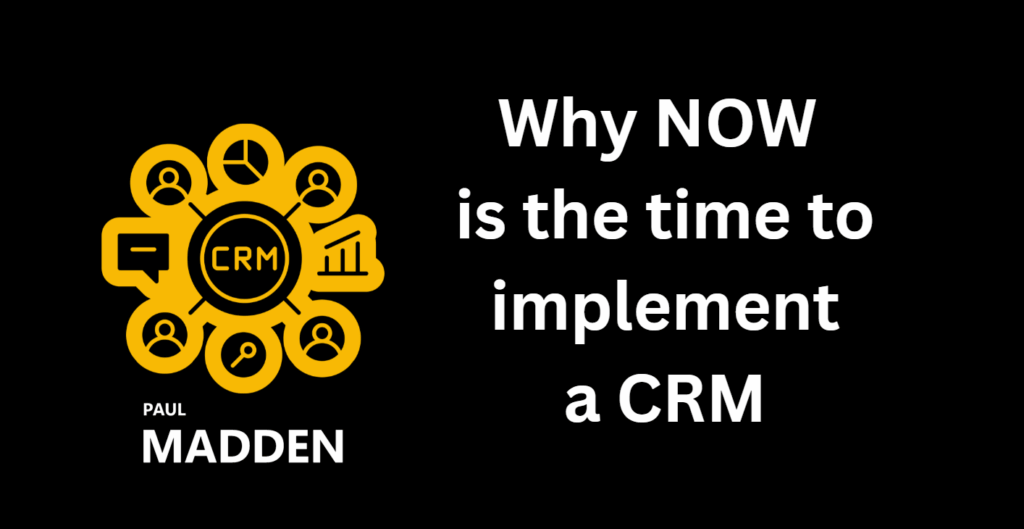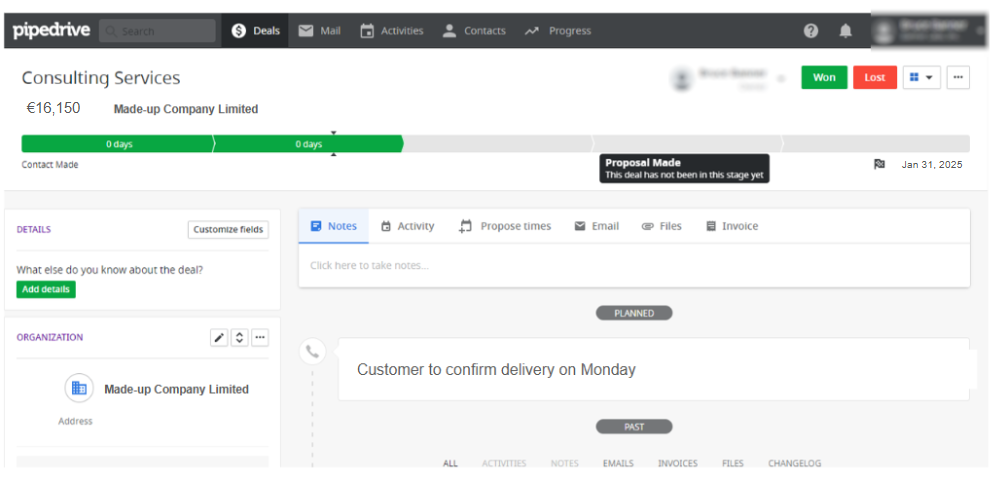The degree to which growing businesses utilise a CRM varies widely in my experience, which can cause operational problems down the line. Whatever stage your business is at, the time to consider embedding a CRM into your daily practice is now.
A CRM (Customer Relationship Management) system helps businesses manage and grow customer relationships in a structured, scalable and efficient way. It helps team members, particularly in sales, to stay focused and offers visibility into operational bottlenecks across the customer lifecycle.
In this article, we look at the 10 top reasons why you should be using a CRM as your business grows. This will be followed by 7 key questions on how to choose the right CRM for your business.

Businesses often exclude a CRM from business planning because (i) they are considered expensive; (ii) they are not needed ‘right now’ i.e. not a priority and/or (iii) a lack of expertise in implementation makes them difficult. Firstly, with so many off-the-shelf options, getting started is no longer very expensive. And if ‘not now’, then when? When it comes to implementation, slow and steady beats the headache of having to introduce a CRM later when your business has more staff, more customers, more data in more places — a headache worth avoiding!
For a lot of founder-led businesses, their smart phone is their CRM – all customer details stored on the phone with many text conversations on WhatsApp. Then they might add a second salesperson and they follow the same pattern. In some ways, this is entirely natural — days are helter skelter with a relentless focus is on winning new business and delivery on promises. Dotting the i’s and crossing the t’s can come later.
But there’s considerable risk in this approach. Phones get lost, order details get missed, sales people leave, operational bottlenecks emerge. Embedding a CRM early centralises customer interactions, contact details and conversation histories in a single, secure place — particularly important in the era of GDPR and data privacy.
You might have encountered some variation of this real-world scenario where you ring a business to enquire about the status of an order:
“Hello, I’m waiting on a delivery that was due this morning, can you help me?
“Deliveries are finished for today. I can’t seem to see any outstanding orders here? Who were you dealing with and I’ll check it out?”
“I can’t remember …. I think the guy’s name was John”
“Sorry, John’s gone to Mauritius on his honeymoon! Won’t be back for a fortnight!”
EEEEK! It happens. It doesn’t make a good impression on customers and it leaves the door open for your competitor next time. Staff go on holidays, they get sick, they sometimes forget to dot the i’s and cross the t’s. A CRM system, with reminders and automation can help to ensure things don’t slip through the cracks leading to timely order processing and better customer satisfaction.
Sales people are very competitive in nature but can tend to seek out the path of least resistance. Instead of working a sales process consistently and thoroughly across all opportunities, they often prioritise based on gut feel and perceived likelihood to convert. This unscientific approach can be successful but it has its limitations. A structured sales process is an important support to natural sales flair. A CRM system will help your sales staff by automation repetitive tasks, visualising progress through a sales funnel, help identify tyre-kickers and refine sales tactics through previous sales data and ideally inform marketing efforts where your sales and marketing teams are aligned.
Good customer experience is seamless — so much so that the customer doesn’t even notice. This seamlessness comes from availability of data — if your #1 salesperson is off on holidays, it shouldn’t matter — any other staff member should be able to look up the customer’s record in the CRM and say “yes, I’ve got your order here, I see you were dealing with John…” Everything is under control! This breathes confidence into the relationship on either side of the phone and builds loyalty over time. CRM systems also allow for personalised automations (e.g. email confirmations, delivery reminders) which help to ensure a smooth customer experience.

Forecasting sales at the start of the year is challenging. With CRM reports on how the previous year played out it can be a little bit easier. A visual pipeline of opportunities with expected close dates and win probabilities based on pipeline stages will help to make sales forecasts and cash flow projections far more predictable and reliable. The sales pipeline can also help with assessing resourcing e.g. if your pipeline shows a sudden glut of customers, you may want to increase customer service head count or if your pipeline is lopsided, you might need to invest more in marketing and/or sales personnel.
Scaling businesses thrive on a winning culture, so when sales, marketing, customer service and support are working in sync with access to the same dataset in real-time, this is a natural catalyst for a collaborative culture. Software alone won’t build the right mindset but the day-to-day habits of different teams will contribute to the desired culture.
Integrations between different software systems will elevate your overall business operation as you grow. Timely introduction of different apps and tools can help your business scale but it’s important to walk before you can run. Over time you can integrate your CRM with your internal communications (e.g. Slack), accounting software (e.g. QuickBooks), document signing (Docusign) and many other applications. This doesn’t have to be very expensive either, middleware like Zapier acts like a bridge between different systems and allows you to scale affordably.
Once CRM becomes embedded in day-to-day operations, scaling becomes that bit easier. With a lot of CRM pricing on a per seat basis, you can add new people as they join. As mentioned above, new integrations can come into play as new departments are created e.g. you might start off with an external accountant but might later hire internally and integrate QuickBooks or another accounting package to support this growth.
Many CRMs (including Salesforce, Zoho, Hubspot, Pipedrive) now include mobile apps so sales people can use them on the go — ideal for field sales as well as desk sales — depending on the CRM you choose, this can include voice notes, caller ID and in-app calling integrations, geolocation check-ins and activity timelines for sales reporting.
Admin can be very tedious and repetitive — especially for salespeople who want to be engaging prospects. Being able to automate much of this work (email follow-ups, notifying colleagues, setting reminders) team members can focus on higher value tasks and being more productive members of the team.
Without a CRM, it’s only a matter of time before customer data becomes siloed, inconsistent or worse forgotten or lost — which can cost your business sales and reputation. With a CRM, even a small team can operate like a much larger organisation and put the foundations in place for scaling their business efficiently.
To provide the best experiences, we use cookies to store and/or access device information. Consenting to cookies will allow us to process data such as browsing behaviour or unique IDs on this site. Not consenting or withdrawing consent, may adversely affect certain features and functions.